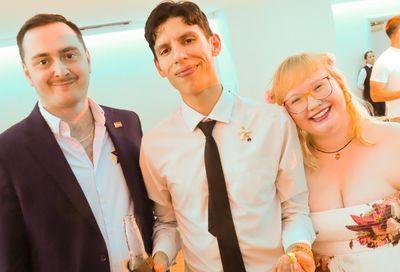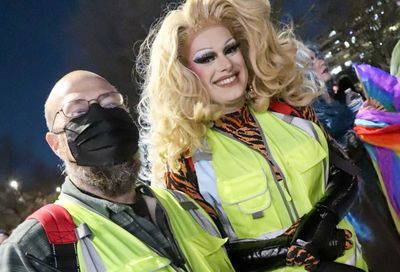LGBTQ Advocates Call For Stamp Honoring Bayard Rustin
Pending bill before Congress would memorialize gay Black civil rights leader in a "forever" stamp issued by the U.S. Postal Service.

In commemoration of Black queer civil rights leader Bayard Rustin’s birthday, on March 17, the National Black Justice Coalition, the nation’s largest Black LGBTQ civil rights organization, has urged Congress to pass the Bayard Rustin Stamp Act, legislation that would direct the U.S. Postal Service to issue a forever stamp depicting Rustin.
The act, introduced by Del. Eleanor Holmes Norton, the District of Columbia’s non-voting member of the U.S. Congress, would memorialize Rustin on a stamp, honoring his life and his many contributions to the Civil Rights Movement, including organizing the first “Freedom Ride” in 1947, the 1955 Montgomery bus boycott, and, working with A. Philip Randolph, the historic March on Washington for Jobs and Freedom in August 1963.
“Bayard Rustin was a master political organizer and pacifist,” David Johns, the executive director of the National Black Justice Coalition, said in a statement. “He spoke truth to power, serving time in prison for refusing to register for the draft and enginnering the first Freedom Rides, which challenged segregation on interstate buses. We would not have the opportunity to celebrate many watershed moments in American and Global history without Rustin’s tireless leadership and labor to the modern civil rights movement as well as the global fight for human rights.
“Moreover, while Rustin was critical to the civil rights movement and organizing the 1963 March on Washington, what many people do not know or celebrate is that Bayard Rustin was a Black, same-gender loving man.”
Born in West Chester, Pennsylvania, on March 17, 1912, Rustin began his work as an activist by protesting Jim Crow Laws that enforced racial segregation, advocating for the desegregation of schools, public transportation, and the workforce. He organized several marches and bus rides to protest racial discrimination.
Although he did much work on behalf of civil rights, he often worked behind the scenes and was often not credited for some of his efforts due to his identity as a Black gay man, which was seen as a liability.
In 1953, Rustin was convicted of “vagrancy” and sentenced to jail for 50 days after being caught having consensual sex with two men in a parked car in Pasadena, California. He was forced to register as a sex offender as a result of his conviction, while the other men arrested with him were never charged. In 2020, Gov. Gavin Newsom posthumously pardoned Rustin, on the grounds that the anti-sodomy statutes he was convicted under have since been overturned and ruled unconstitutional by the U.S. Supreme Court.
“It is critical that we honor Bayard Rustin’s work in the Civil Rights movement,” Johns said in a statement. “It is our firm belief that ensuring the contributions of Black trans, queer, and non-binary/non-conforming members of our community are recognized while also implementing bills like the John Lewis Voting Rights Advancement Act and the Equality Act will advance the legacy of Brother Bayard and the modern Civil Rights movement into the next generation. But to honor Bayard specifically, we urge Congress to pass the Bayard Rustin Stamp Act and make him a forever figure in our country.”
Laura Buisson, an Echo Park Neighborhood Council representative and Los Angeles-based activist who is a founding member of NBJC’s Good Trouble Network of Black LGBTQ elected officials, is organizing a grassroots campaign aimed at galvanizing support for creating a stamp in Rustin’s memory and urging members of Congress to approve Norton’s legislation.
“Any civil rights milestone one can name, Bayard Rustin did it first, and paid a heavier price all while being his authentic self: A Black, gay and Quaker man who devoted his life to being a stick in the wheel of injustice,” Buisson said in a statement. “While the March on Washington has been honored with a USPS stamp, not so the man who made it happen. Enshrining Rustin’s momentous contributions to the Civil Rights Movement in American culture is a long overdue honor that can be rectified this congressional term.”
Support Metro Weekly’s Journalism
These are challenging times for news organizations. And yet it’s crucial we stay active and provide vital resources and information to both our local readers and the world. So won’t you please take a moment and consider supporting Metro Weekly with a membership? For as little as $5 a month, you can help ensure Metro Weekly magazine and MetroWeekly.com remain free, viable resources as we provide the best, most diverse, culturally-resonant LGBTQ coverage in both the D.C. region and around the world. Memberships come with exclusive perks and discounts, your own personal digital delivery of each week’s magazine (and an archive), access to our Member's Lounge when it launches this fall, and exclusive members-only items like Metro Weekly Membership Mugs and Tote Bags! Check out all our membership levels here and please join us today!




















You must be logged in to post a comment.